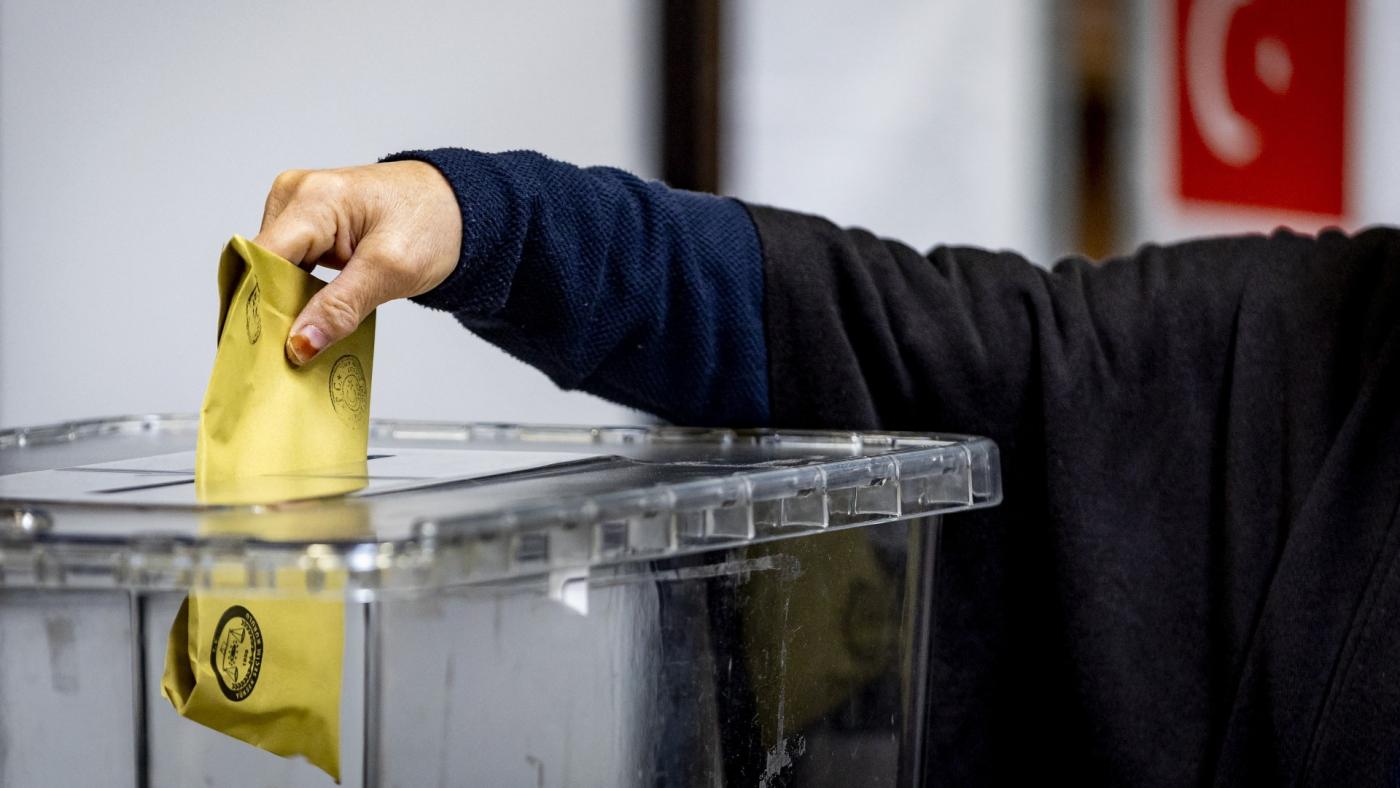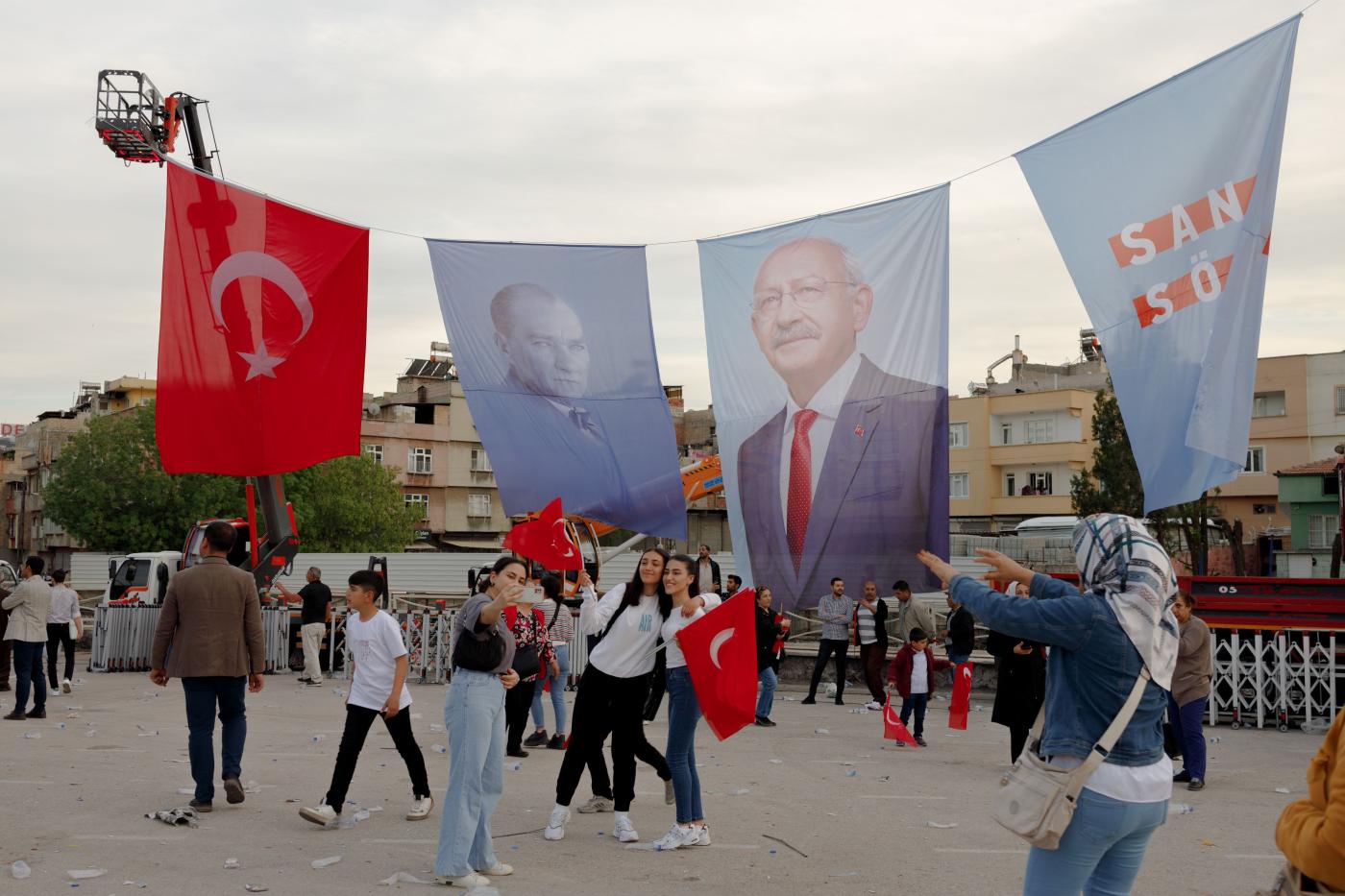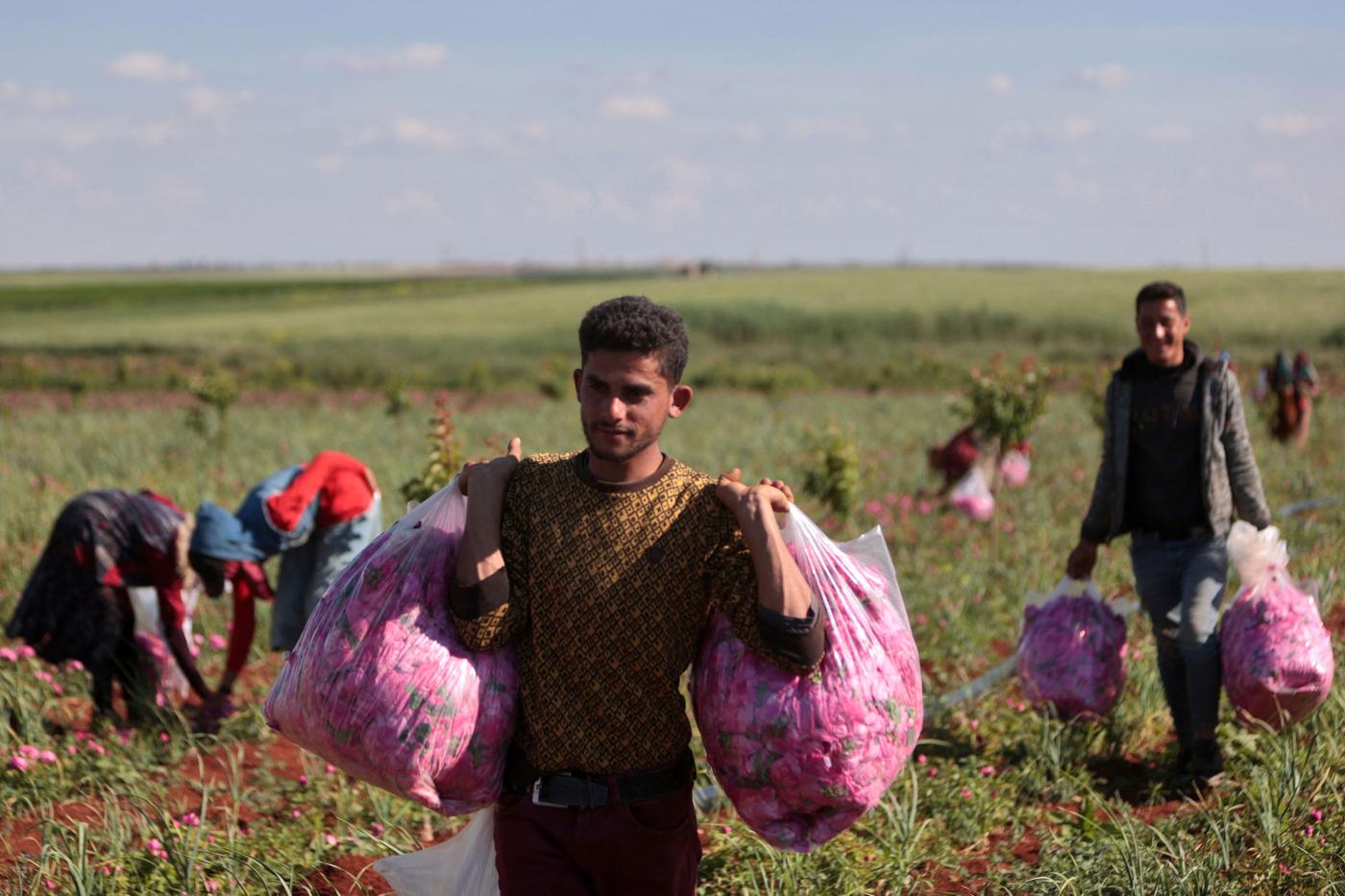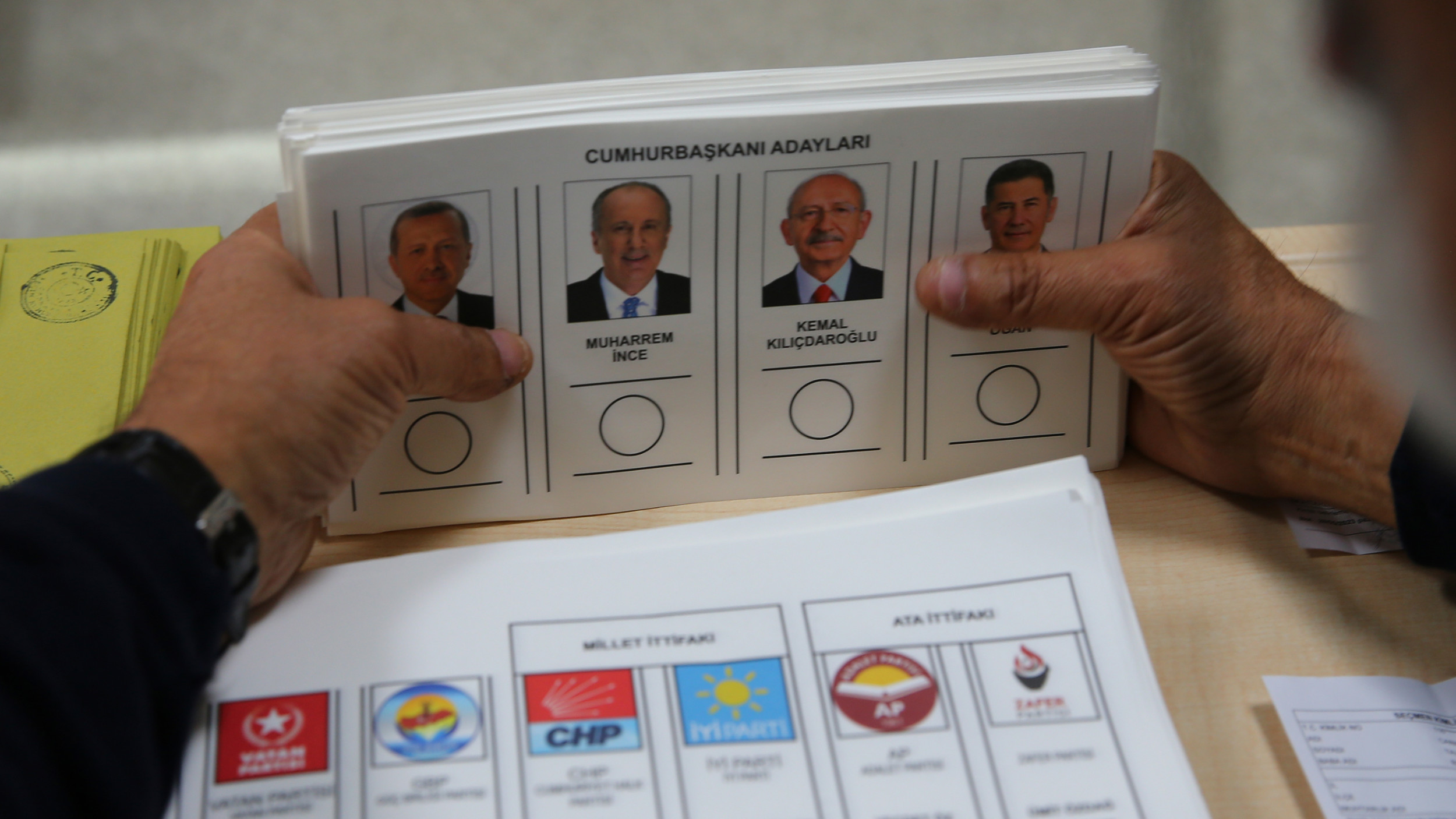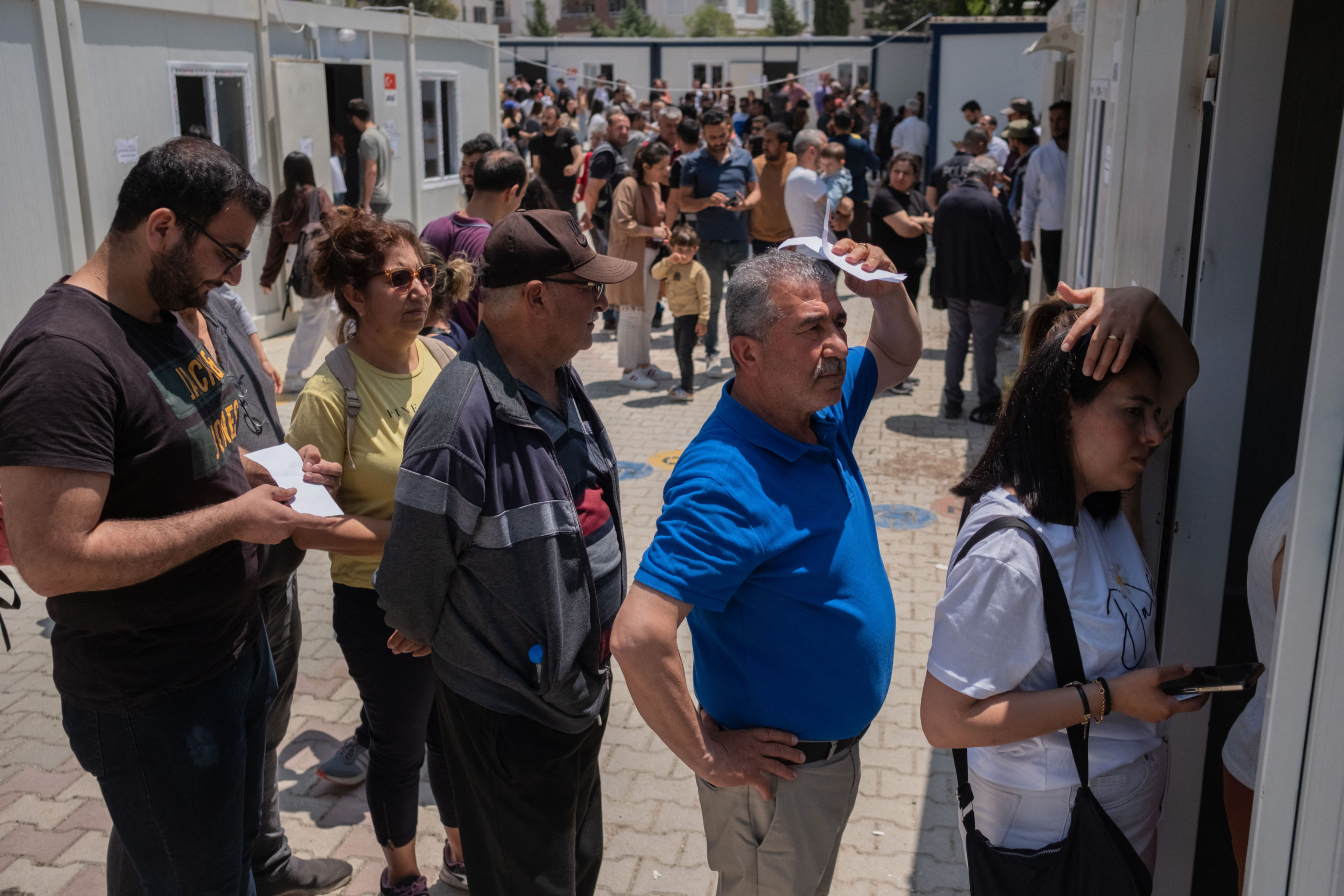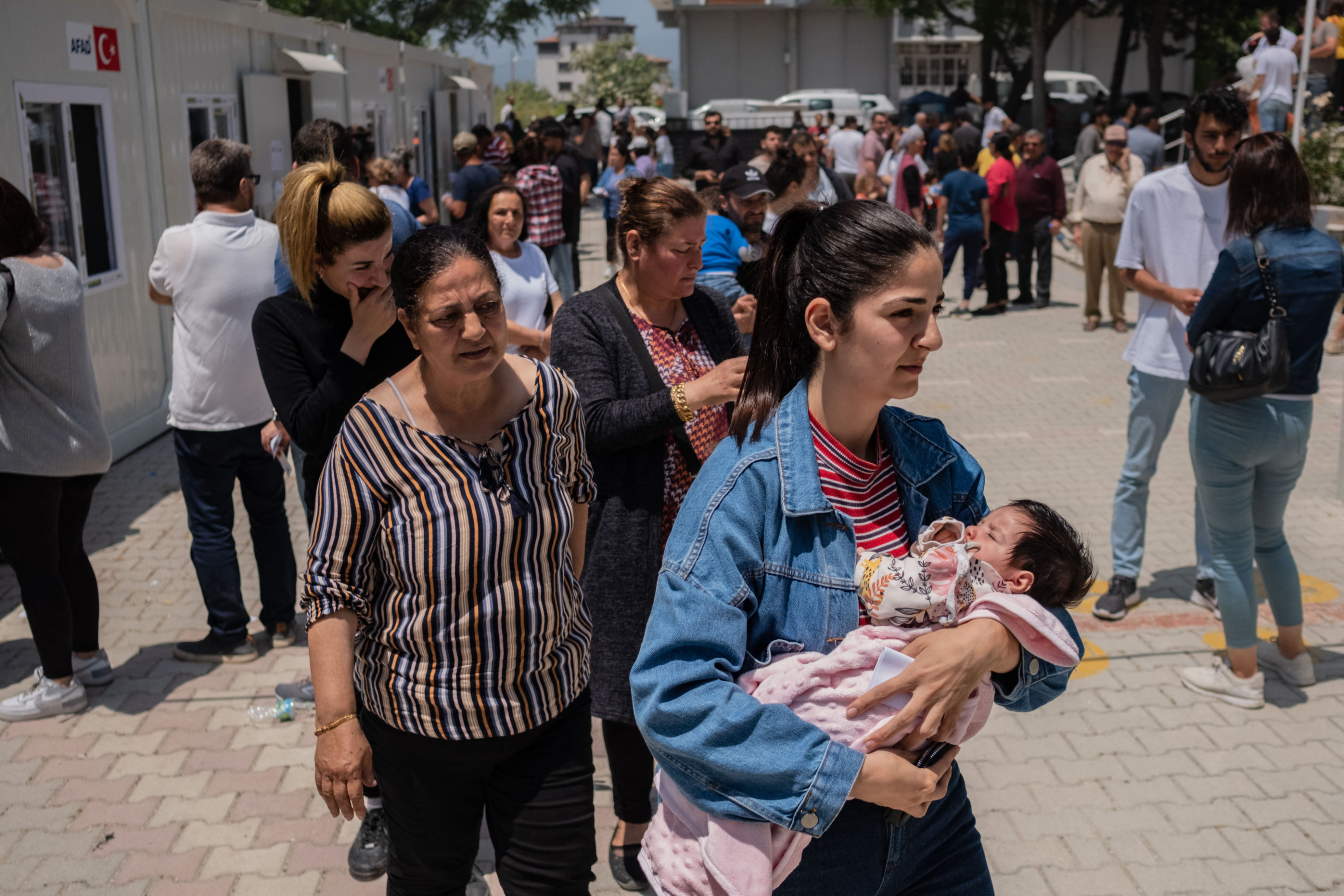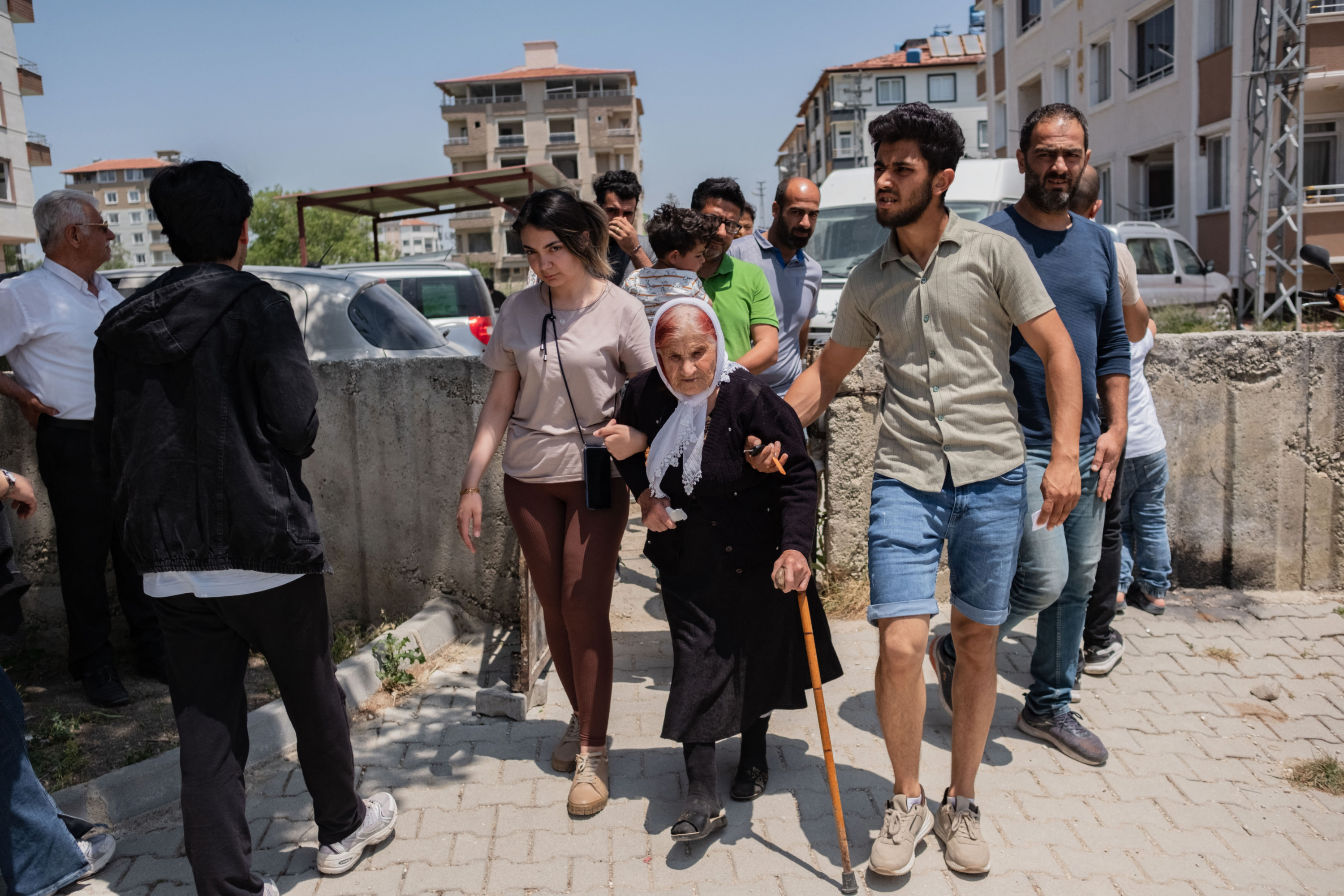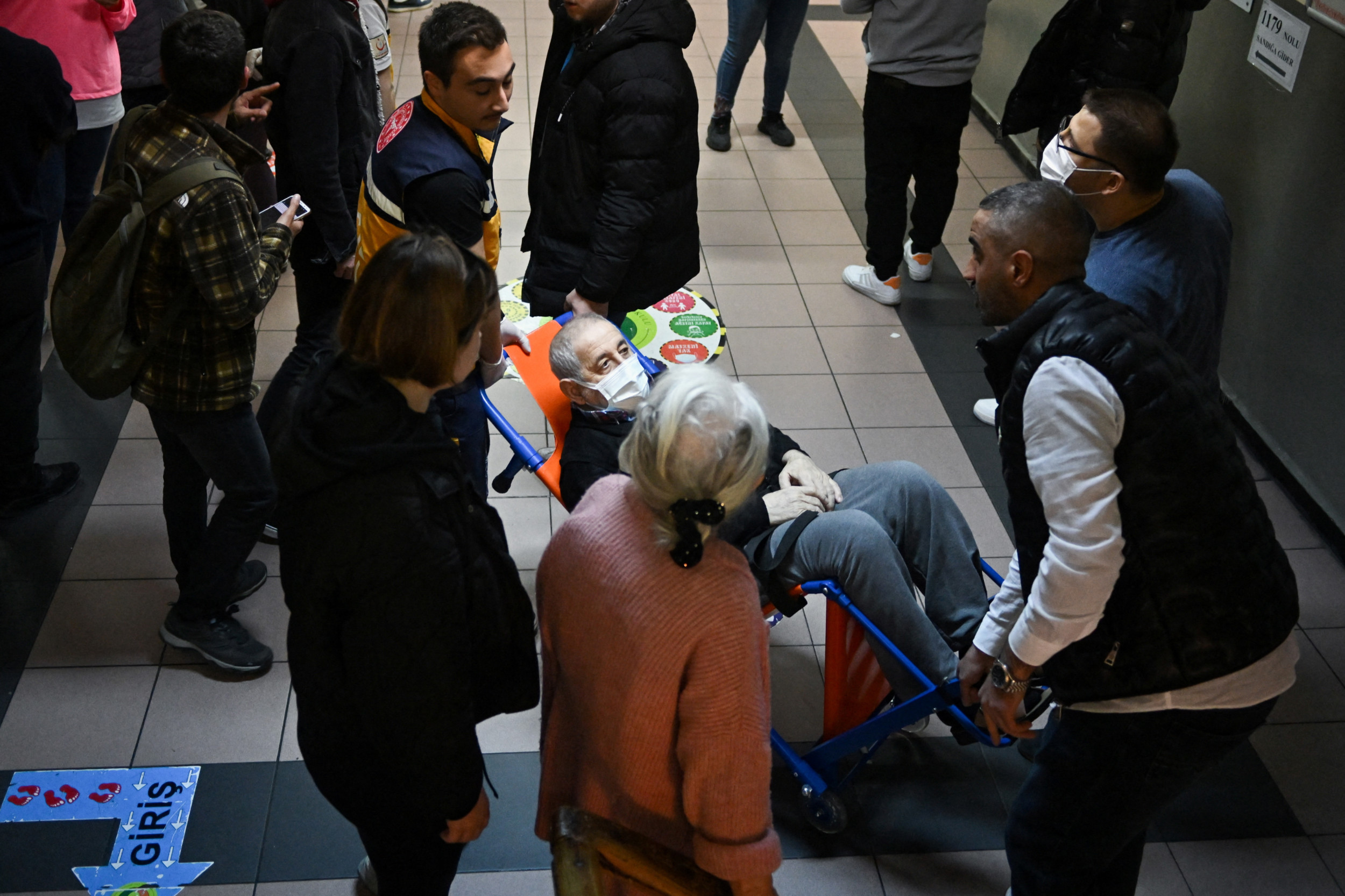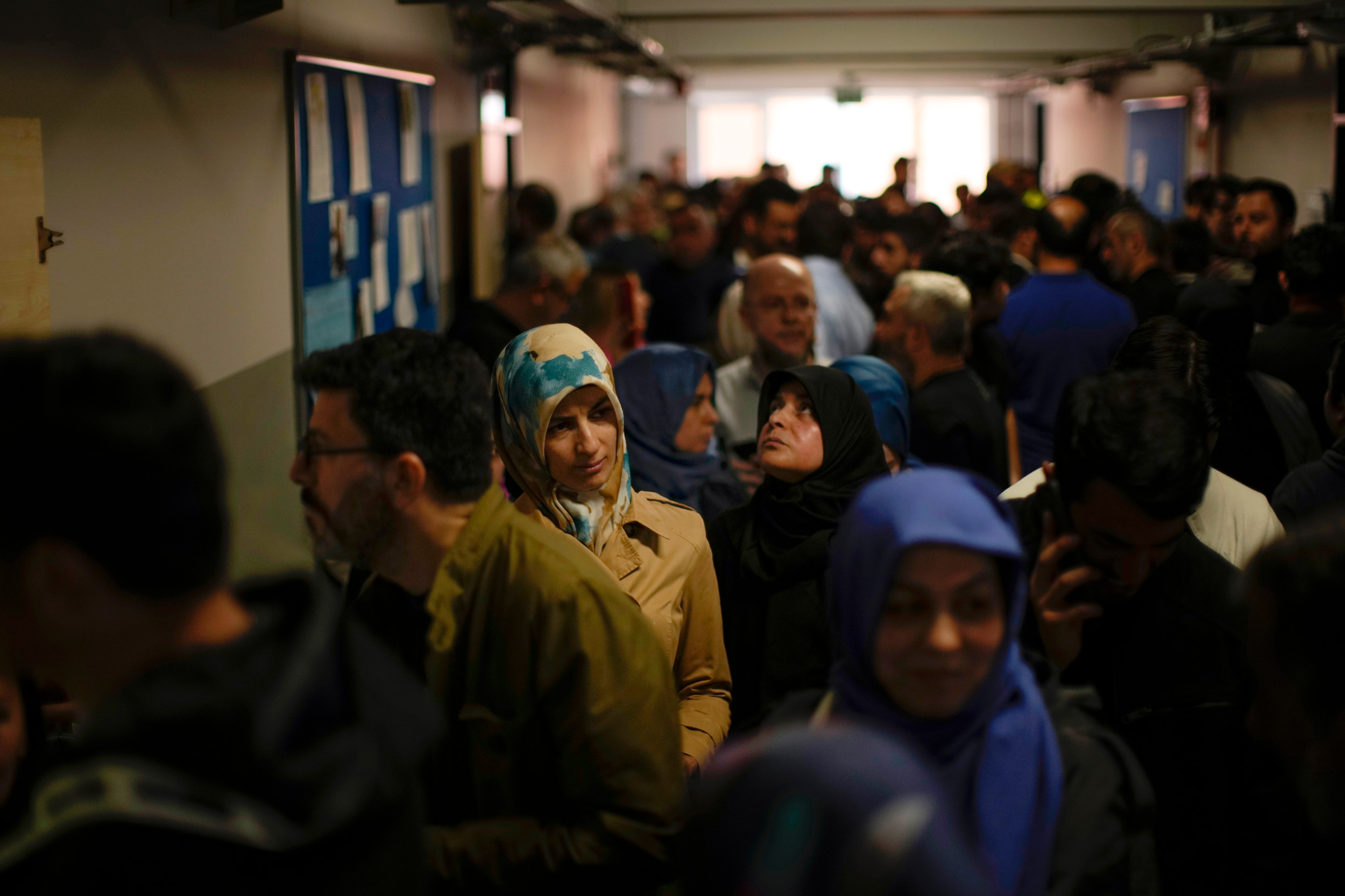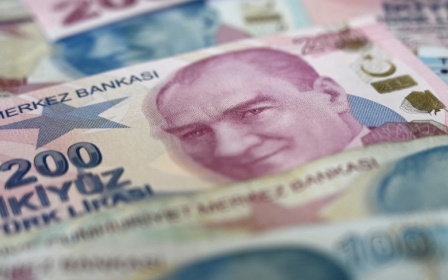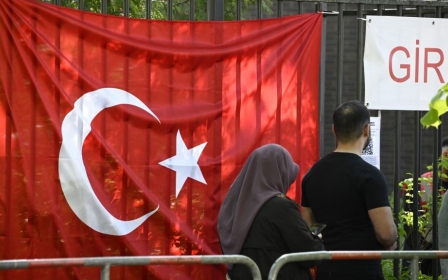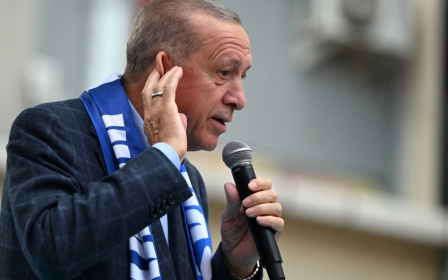Turkey elections live: Lira tumbles as runoff confirmed
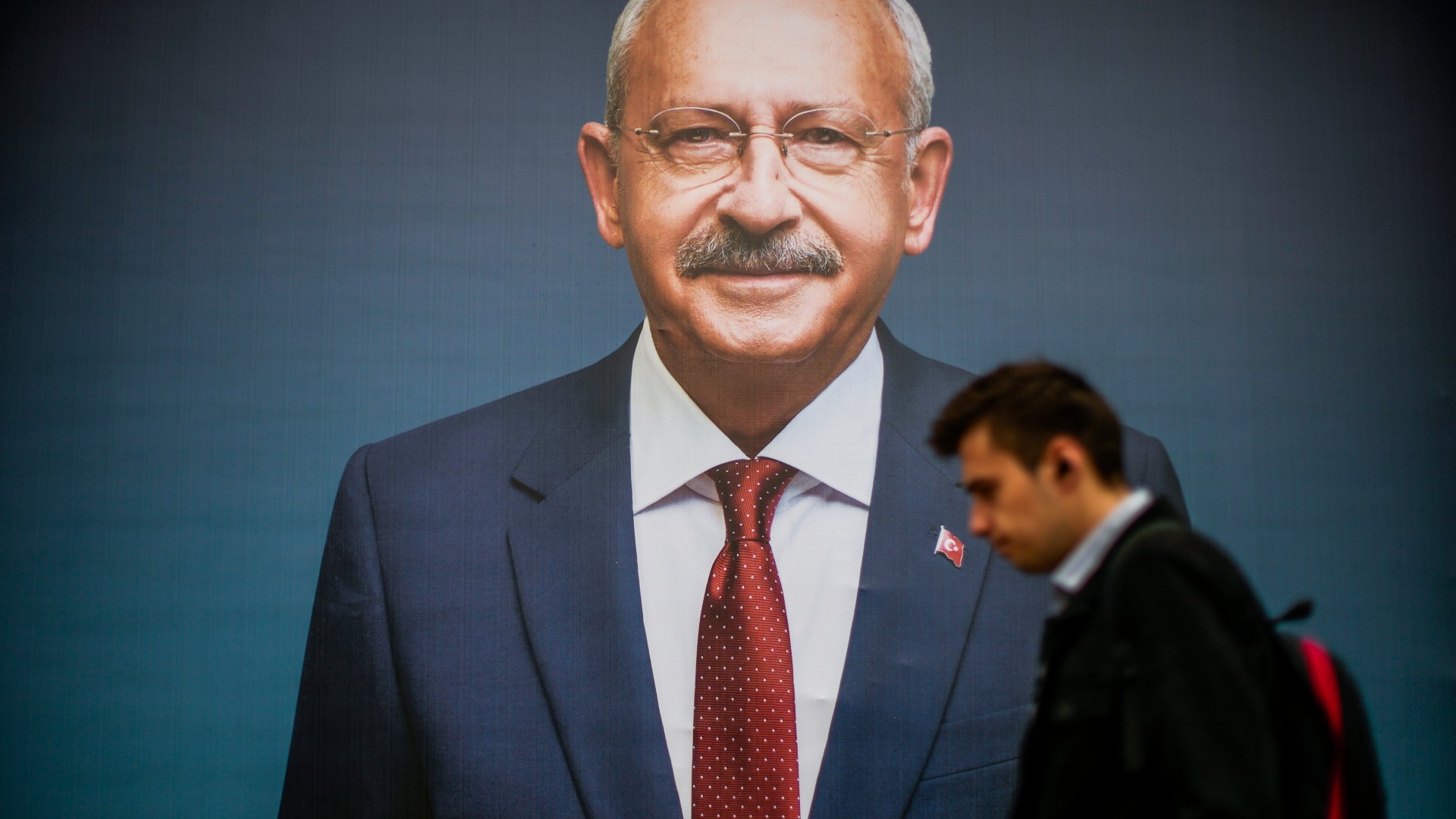
Mises à jour du direct
Insight from Ragip Soylu, MEE’s Turkey bureau chief:
The election will be fiercely fought in large cities like Istanbul, Ankara, Izmir and Antalya, where most of the population lives. Erdogan has been considerably less popular in large cities since the 2019 elections. This is why the balance may change in coming hours and Kilicdaroglu’s vote share will grow.
In Kurdish majority areas, for example, initial results suggest Kilicdaroglu had a really strong margin. He got 66.3 percent of the votes in Diyarbakir, 56 percent in Van, 55 percent in Mardin and 72 percent in Hakkari.
More results! With 21.3 percent of the votes counted, we have:
• Erdogan: 55.0 percent
• Kilicdaroglu: 39 percent
• Ogan: 5.4 percent
As you can see, the gap between Erdogan and Kilicdaroglu is narrowing a bit as more votes are counted. Ogan’s vote has risen slightly.
Kilicdaroglu got the majority of the votes in the polling station where he cast his vote in Ankara. He also got the lead at his competitor Sinan Ogan’s place of voting too.
In 2019, Anadolu Agency failed to update election data beyond the 98.7 percent mark for more than 12 hours when it appeared the CHP candidate was on course to win the Istanbul mayoral election.
People accused the state news agency of favouring the AKP.
Officials at the agency told Middle East Eye that they are aiming to deliver up-to-the-minute results to the media after facing a deluge of criticism four years ago.
"We don't want to be a subject of the election debate, especially on the day of the vote," Yusuf Ozhan, the editor-in-chief at Anadolu, told MEE.
Founded more than 100 years ago, Anadolu is considered the main source of information on election results, with local TV channels, newspapers and popular news sites relying on the agency for the latest updates.
"Our total manpower is 2,500, that includes journalists, freelancers and administrative staff, who can cover 50,000 ballot boxes," Ozhan said.
"But we will have at least a journalist in all and every 765 provincial districts where the records would be merged from the smaller districts."
Read more here:
Turkey elections results tracker hopes to avoid 2019 fiasco
Initial results are in, with 9.1 percent of the votes counted.
• Erdogan: 59.5 percent
• Kilicdaroglu: 34.8 percent
• Ogan: 5.1 percent
Ogan is performing surprisingly well, per Anadolu Agency data. Kilicdaroglu is expected to be far behind at first but will catch up as the night goes on.
It’s expected to be an incredibly tight race. But don’t forget that not so long ago, Erdogan and the AKP were much further behind in the polls.
On Friday, MEE’s Turkey bureau chief Ragip Soylu took a look at the feeling within the Erdogan campaign, and what tactics they’ve used to get parity with the opposition and perhaps even inch ahead.
Here’s an excerpt:
When the Turkish president’s people looked at the polling in June last year and saw that their ruling Justice and Development Party (AKP) had dropped below the 30 percent mark, they became worried.
Annual inflation was surging, the Turkish lira was depreciating and people were unhappy. Many interviewed by Middle East Eye back then didn’t know how Turkish President Recep Tayyip Erdogan could make a comeback in time for Sunday's presidential and parliamentary elections.
But Erdogan and his lieutenants developed a plan: they boosted wages for the public and private sector, flooded the market with cheap credit for home buyers, launched an amnesty on unpaid taxes, and began a major public sector recruitment drive.
And to stabilise the lira, they funded the central bank’s backdoor methods by taking money from Russia, Saudi Arabia, Qatar, the UAE and Azerbaijan.
Populism worked. The AKP’s ratings rose month by month, jumping by six points between June and January.
Read more here:
Inside the campaign to give Erdogan one final victory
The Supreme Election Council has just lifted the broadcast ban on election results.
All media are able to publish results as they get them, so we’ll begin to get a picture of how things are looking.
There are around 220,000 Syrians who have obtained Turkish citizenship and are eligible to vote.
As polls closed in Turkey, Middle East Eye spoke to two Syrian Turkish voters, who cast their ballots in an atmosphere of increasing hostility against Syrian refugees.
Yahya, 25, first arrived in Turkey more than 10 years ago, as the Syrian conflict escalated.
He’s in the process of finishing a master’s degree in mathematical engineering in Istanbul and today is the first Turkish election in which he is eligible to vote.
Yahya said he voted for President Recep Tayyip Erdogan without hesitation.
“I think Erdogan is the right person for the Syrian refugees to live in peace in Turkey,” said Yahya.
The opposition, says Yahya, “treat us as if we are from a lower class, as if we are ignorant, and we cannot be like them. They want us to leave this country and send us back to Syria. That would put people like me in danger and set our lives back years.”
While the opposition has gone to great pains to project itself as a defender of the rule of law and justice, many Syrians are fearful that they could face sudden and arbitrary detention and worse deportation.
Presidential candidate Kemal Kilicdaroglu has vowed to send Syrians back to their country within two years.
Mohamed, 29, who didn’t wish to give his surname because of the sensitivity around Syrians voting in the elections, also voted for Erdogan due to his “visionary projects”.
Asked what he thought of the opposition, Mohamed, who is doing a master’s in sociology, said: “It is enough to examine the degrading rhetoric the opposition has engaged in over the last five years. This rhetoric seeks to isolate Syrians in Turkey socially and culturally.”
You can read more about Syrian Turkish voters in this piece by Stefania D'Ignoti reported from Gaziantep:
Turkish-Syrian voters see Erdogan as 'lesser of two evils'
And on the plans to repatriate Syrian refugees, Yusuf Selman Inanc reported from Syria’s Idlib province. You can see that here:
Turkish politicians vow to send Syrians back after elections - but to where?
Presidential candidate Kemal Kilicdaroglu has issued a call to “our heroes of democracy”, telling his supporters and observers to make sure all votes are counted in a legitimate manner.
“Never leave the ballot boxes, no matter what, until the last signed ballot box report is delivered. The full and correct manifestation of the will of the people depends on your determination. You will see, it will be worth your tiredness,” he said.
Starbucks, the American multinational chain of coffeehouses, has been forced to deny that its workers couldn’t vote in the Turkish elections because of their shift hours.
"The operating hours of all our stores allow our employees to vote. The working hours of our employees are properly adjusted," the company said in a statement on Twitter.
Ozgun Emre Koc, a Twitter user with more than 240,000 followers, initially made the claim in a tweet that said Starbucks employees had messaged him saying most employees were not able to leave work before 4pm local time and with only an hour left to vote. The tweet went viral.
After Starbucks denied it was hindering its employees from voting, Koc highlighted a statement from Turkey's Supreme Election Board that said the chain and similar places should be closed on election day so people working there could vote.
Cafes are normally closed in Turkey during voting hours.
With the polls now shut, President Recep Tayyip Erdogan has said the "voting process was completed in a way that befits our democracy, thank God".
"Now, as always, it's time to hold tight to the ballot boxes. Until the results are final, we continue to protect the will of our nation!" he tweeted.
Ahmet Yener, chairman of the election board, said there had been no negative situations, though one party observer and two voters died of heart attacks.
Here's what you need to know about what will happen in the next few hours after polls closed:
-
The counting process began as soon as polls closed
-
There are still long queues in some places - they will be allowed to vote
-
Erdogan will follow results from the capital Ankara, unlike in recent elections, when he stayed in Istanbul for the day
-
There are no exit polls in Turkey - don't expect one
-
A broadcast ban on elections is expected to be lifted around 8pm local time (5pm GMT)
-
We might get a better picture of preliminary results around midnight local time
Polls across Turkey closed at 5pm local time (2pm GMT) after a tightly contested election campaign.
From the moment polls opened at 8am, the voter turnout was noticeably high.
Long queues continued throughout the day in polling stations across the country even as the voting deadline came into effect.
Citizens inside polling centres by the 5pm cut-off time are allowed to cast their votes, but the gates of the stations are closed.
Turkey has a history of a high voter turnout, with over 86 percent of registered voters casting their ballot in the 2018 elections. Observers say this year's elections could see an even higher rate.
President Recep Tayyip Erdogan unusually arrived in Ankara from Istanbul after he voted earlier in the day.
Many believe he wanted to be in the capital to closely follow the election results, which are expected to be tight.
Other than some small-scale irregularities, the voting process was calm and orderly.
A broadcast ban will be in place until 9pm local time, although in the past the Supreme Election Board lifted the ban an hour earlier.
Turkish citizens living abroad came out in record numbers to vote in the elections.
On 9 May, Turkey's Supreme Election Board (YSK), which manages the country's elections, said that more than 1.8 million votes were cast abroad.
The voter turnout exceeded 53 percent, which according to the YSK is the highest rate since the 2011 elections.
The participation rate, however, is still low compared with Turkey, where it exceeded 86 percent in 2018.
The largest bloc outside of Turkey is in Germany, where more than 1.5 million people are eligible to vote, making them an important voice in shaping the future of the country.
After Istanbul, Ankara and Izmir, voters abroad are the most important electoral districts collectively, with more than three million eligible to vote.
According to the YSK, women between the ages of 50-64 living abroad show the greatest interest in the elections, with a 70 percent turnout in the 2018 elections.
The lowest turnout is among male voters between the ages of 18-34 and 65-75+ for female voters.
In Germany at least, the ruling Justice and Development Party (AKP) is expected to hold a commanding position, albeit a diminished one from 2018.
Caner Aver, an expert on German-Turkish relations at the Center for Turkish Studies and Integration Research in Essen, recently told Middle East Eye that he believes that while the AKP will once again be the strongest force in the upcoming elections, it is unlikely to hold the clear lead it held in 2018.
Turkish President Recep Tayyip Erdogan made a surprise visit to the capital Ankara after he cast his vote in Istanbul earlier in the day.
In previous elections, Erdogan usually stayed in Istanbul on voting day, following results from his residence.
Millions of people in Turkey from all walks of life continued to line up to cast their votes across the country in mid-afternoon, with polls set to close at 5pm local time (2pm GMT).
In one polling station in Istanbul, a man who couldn't travel due to his illness was brought in by an ambulance to vote.
A mother arrived with her infant baby at another polling station in Antakya, one of the cities devastated in February's twin earthquakes.


